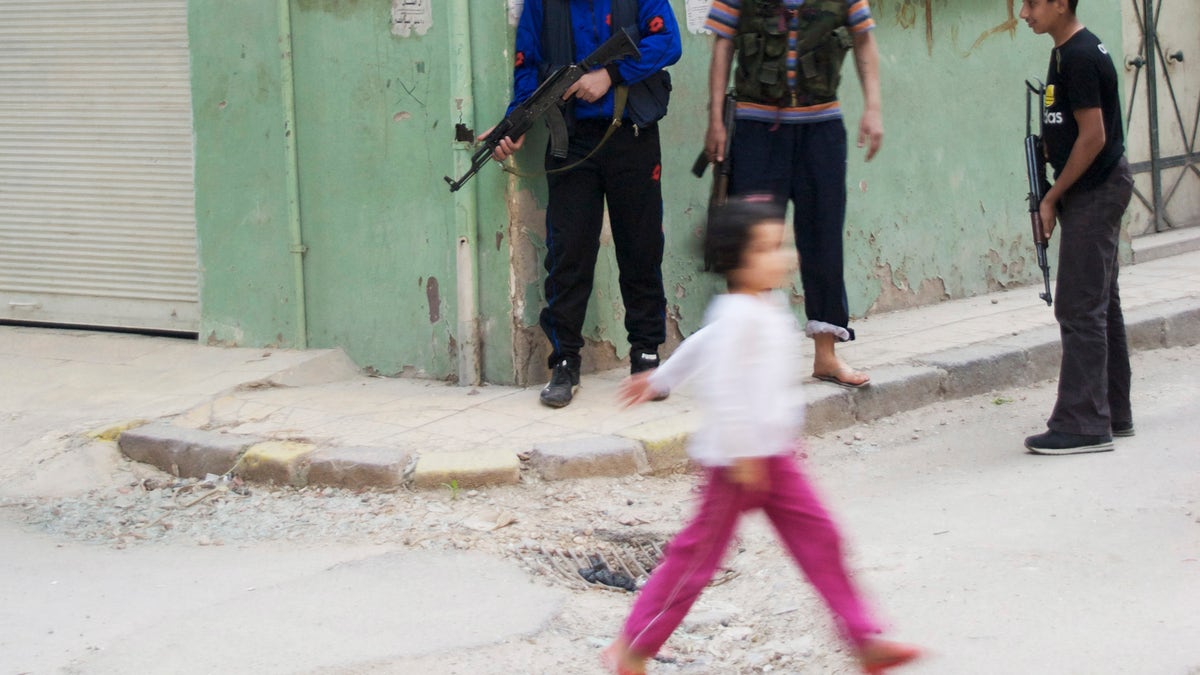
May 14, 2012: In this photo, a girl walks past Syrian rebels at Khaldiyeh neighborhood in Homs province, central Syria.
BEIRUT – Syrian forces are targeting medical workers and patients who were wounded in the 14-month-old conflict, forcing doctors to scramble to help the injured in makeshift clinics, an international aid agency warned Tuesday.
Medecins Sans Frontieres, or Doctors Without Borders, which is not authorized to work in Syria, sent teams into the country secretly. They reached the rebellious areas of Homs and Idlib, where they found patients and doctors at risk of attack and arrest.
"Being caught with patients is like being caught with a weapon," the group quoted an orthopedic surgeon as saying in an Idlib village. "The atmosphere in most medical facilities is extremely tense; health care workers send wounded patients home and provide only first aid so that facilities can be evacuated quickly in the event of a military operation."
Homs and Idlib have been among the hardest hit regions in President Bashar Assad's military crackdown and rebel attacks on soldiers and other regime targets.
Doctors Without Borders called on all parties in the conflict to fully respect the wounded, health workers and medical facilities.
There have been previous reports of authorities targeting medical facilities, health workers and their patients in Syria and in Bahrain, which has seen widespread protests led by the country's Shiite majority against the long-ruling Sunni monarchy. The reports indicate many of the injured forgo treatment because they fear being detained and tortured if they seek care at government-controlled medical facilities.
"A number of Syrian colleagues are reported to be missing," said Marie-Noelle Rodrigue, MSF's director of operations in Paris. "The authorities and all parties to the conflict must ensure that medical workers can operate without fear of retribution and that wounded people can safely seek and receive immediate lifesaving care, without resorting to inadequate improvised clinics for fear of arrest, or worse."
An MSF surgeon said his team in Idlib had to flee a public hospital in 10 minutes after being notified of an imminent attack.
"We saw militarized health care facilities, meaning that access to medical care depends on which side you belong," said Brice de le Vingne, MSF's director of operations in Brussels.
The Syrian uprising began in March 2011 with mostly peaceful protests calling for change, but a relentless government crackdown led many in the opposition to take up arms. Some soldiers also have switched sides and joined forces with the rebels.
World powers have backed a peace plan that was put forward by U.N.-Arab League envoy Kofi Annan, but the bloodshed has not stopped. More than 200 U.N. observers have been deployed in Syria to oversee the truce between the government and armed rebels. The U.N. estimates the conflict has killed more than 9,000 people.
U.N. spokesman Hassan Seklawi said 211 military observers as well as 66 civilian U.N. staffers working for the observation mission have been deployed in the country, with teams based in major cities such as Aleppo, Hama, Idlib, Deir el-Zour, Daraa and Homs.
The number of military observers is expected to reach the maximum of 300 later this month.
The Britain-based Syrian Observatory for Human Rights and the Local Coordination Committees activist group said Tuesday at least three people were killed in an explosion the night before in the Syrian coastal city of Banias, home to one of the country's two oil refineries. The explosion destroyed a building but the nature of the blast was still not clear, the Observatory said.
Both groups also reported shooting by government troops in the eastern city of Deir el-Zour near the border with Iraq that left at least three people dead. They added that the central town of Rastan was again under intense shelling by government troops.
Also Tuesday, Khalaf al-Azzawi, the chairman of Syria's Higher Committee of the Elections, said voter turnout in last week's parliamentary elections was 51.26 percent.
The elections were the first under a new constitution, adopted three months ago, that allows political parties to compete with Assad's ruling Baath party. The new constitution also limits the president to two, seven-year terms.
The government has praised the vote as a milestone in promised political reforms, but the opposition boycotted the polls and said they were orchestrated by the regime to strengthen Assad's grip on power.
Al-Azzawi did not give a breakdown or say how many of the 250-member legislature's seats were won by the 10 parties of the National Progressive Front, an alliance dominated by the ruling Baath party.
Among the winners were Qadri Jamil and Omar Ossi, two politicians who describe themselves as opposition figures. Thirty women also won seats, a similar figure to that of the outgoing parliament.
Across the border in Lebanon, Lebanese troops deployed Tuesday in tense areas of the northern city of Tripoli after three days of sectarian clashes killed at least six people in a spillover of the conflict in Syria.
Lebanon and Syria share a complex web of political and sectarian ties and rivalries, which are easily enflamed as Sunni Muslims who support the rebels trying to oust Assad battle members of the tiny Alawite sect, followers of an offshoot of Shiite Islam who are Assad's most loyal supporters.
